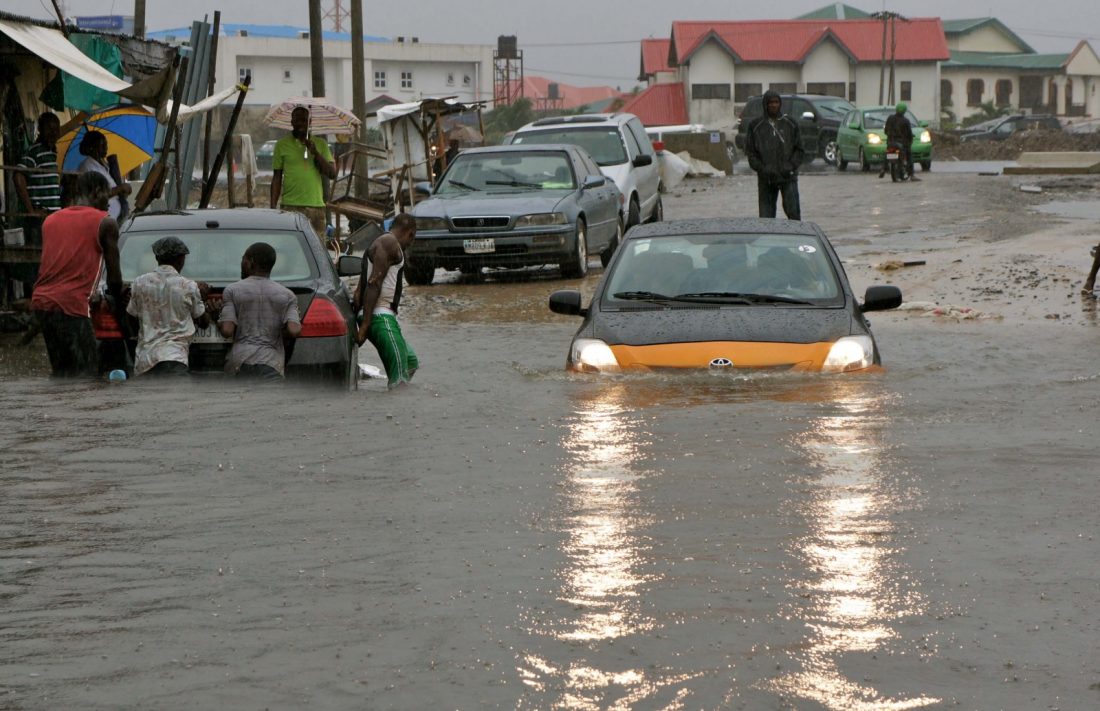The Nigerian Correctional Services has evacuated the Bagudo Prison, in Bagudo Local Government Area, LGA, of Kebbi State, after it became flooded.
The floods, which began two weeks ago following heavy rains, has been wreaking havoc in 11 of the state’s 21 Local Government Areas, LGA, claiming lives, destroying property, and cutting off several communities from the state capital, Birnin Kebbi.
Muhammad Kaura Danhakimi, the chairman of Bagudo LGA, told journalists that the inmates were relocated on Friday, September 11, 2020, to the Birnin Kebbi Correctional Centre.
Danhakimi said the floods had also sacked the Tugga Airport, an airstrip serving Bagudo.
Many houses were also destroyed, livestock and farmlands submerged and residents relocated to an Internally Displaced Persons, IDPs, camp in the LGA.
The Bagudo-Tugga-Kaoje highway, which leads to the Benin Republic border, including the Tuga Bridge, was also submerged, cutting off border communities and traders conveying farm produce to the Southern states.
The Nation also learnt that the Kebbi State Government is considering closing an international highway in Birnin Kebbi linking Nigeria and Niger Republic following the threat of damage by flood.
The Birnin Kebbi-Makera-Kangiwa Highway which runs from Birnin Kebbi, is at risk of caving in at Duku, 40 kilometres to the border with Nigeria’s northern neighbour.
Some of the minor bridges, culverts along the highway are caving in, following erosion caused by rising water overflowing the nearby Rima River.
Muhammad Sabo Nanono, the minister of Agriculture and Rural Development, on Saturday, September 12, 2020, pledged the Federal Government’s assistance for thousands of farmers whose farms were destroyed by the floods.
Nanono spoke at the Emir of Gwandu’s Palace in Birnin Kebbi, after being led by Governor Abubakar Atiku Bagudu on an on-the-spot assessment of the devastation at Duku.
“I want to assure the farmers that the Federal Government through this ministry will do everything possible to assist the farmers, ranging from seedlings, fertiliser, and other necessary things for them to survive their distraught predicament.
“Kebbi State is an important place to the Federal Government, due to its strength in food production, and as such we’ll do everything possible to assist farmers who have incurred losses due to the flooding,” Nanono said.
The minister appealed to farmers not to be deterred by the havoc, but to swing back into food production when the water recedes.
Governor Bagudu, who earlier visited and commiserated with hundreds of IDPs whose houses and property were destroyed by the floods in several hard-hit communities of Bagudo and Kende, directed immediate provision of food, water, and construction of additional toilets.
He noted that two major federal government bridges, the Kende, and Tugga bridges were at the verge of being submerged, while the floods had completely overtaken Kende town with the houses submerged in water and many people rendered homeless.
The women and children were housed at Bagudo Kudu Primary School and Government Day Secondary School Kende
Speaking at Bagudo Kudu Primary School, Bagudu said the state would assist flood victims to rebuild their houses.
Those whose homes could not be rebuilt when the flood waters recede, would be relocated, he said.
Bagudo said: “We are all concerned with your inevitable plight and President Muhammadu Buhari is sympathising with all of you.
“We are all in it. It is a collective loss and concerned, but the state government will do everything humanly possible to alleviate your suffering.”
Already, five bridges in different parts of the state have been washed away by flood, according to the Kebbi State Emergency Management Agency, KSEMA, chairman, Alhaji Sani Dododo.
Dododo and Kebbi State Information Service Deputy Director, Umaru Rasheed Gulma, told journalists during a tour of the area on Friday that portions of the Duku section of the road may not withstand further erosion.
They said the erosion was caused by water rushing over 10 kilometres inland from Rima River, a tributary of River Sokoto in Sokoto State, adding that it was a threat to motorists and other road users.
“The state government is considering closing the road to avoid it caving in suddenly and trapping vehicles,” Dododo said.
10 villages at Duku, with hundreds of mostly rice and millet farms along the highway were seen to be underwater.
The villages are: Wabaku Hausawa, Wabaku Fulani, Bori, Dukuwo, Kalango, Ungwa Kayi, Ungwa Alunmadi, Bokulo, Akwara, Takaluwu and Gawassu.
The residents, cut off from the highway, were seen evacuating the belongings via canoe.
Gulma told journalists Governor Abubakar Atiku Bagudu, was proving relief materials and had concluded plans to move internally displaced persons, IDPs, to a resettlement camp in the nearby Kalgo Local Government Area, LGA.
Thousands of hectares are also reeling under the strain of the environmental disaster.
In Jega LGA, hometown of former Independent National Electoral Commission Chairman, Prof Attahiru Jega, farmlands belonging to no fewer than 50,000 farmers were said to be destroyed by the floods overflowing River Zamfara.
Muawuya Aliyu, the secretary of the Rice Farmers Association of Jega, said all of its members’ rice and millet farms were affected.
At Argungu LGA, famous for its annual fishing festival, the floods damaged another international highway linking Niger Republic, forcing the community to partially restrict vehicular movement on a bridge.
Argungu Chairman Musa Mohammed Tungunlawa said a portion of the Gargagawo Bridge on Argungu-Natsini Road to Kangina and Niger Republic had partially caved in.
“We’ve stopped heavy trucks from using the bridge”, he said, adding that all 11 wards were affected by the floods, with thousands moved to nine IDP camps.”
Nationwide, 15 states identified as being threatened by the flooding are on red alert by the Nigeria Hydrological Services Agency, NIHSA.
The states include Niger, Lagos, Edo, Imo, Abia, Jigawa, Adamawa, Delta, Rivers, Cross Rivers, Oyo, Enugu, Kebbi, Nasarawa, Bauchi, and the Federal Capital Territory.
The NIHSA said the waters are from the upper reaches of the Niger Basin comprising Guinea, Mali, Niger, Burkina Faso, Cote d’Ivoire, Benin, Chad, and Cameroon.
Source: The Nation







